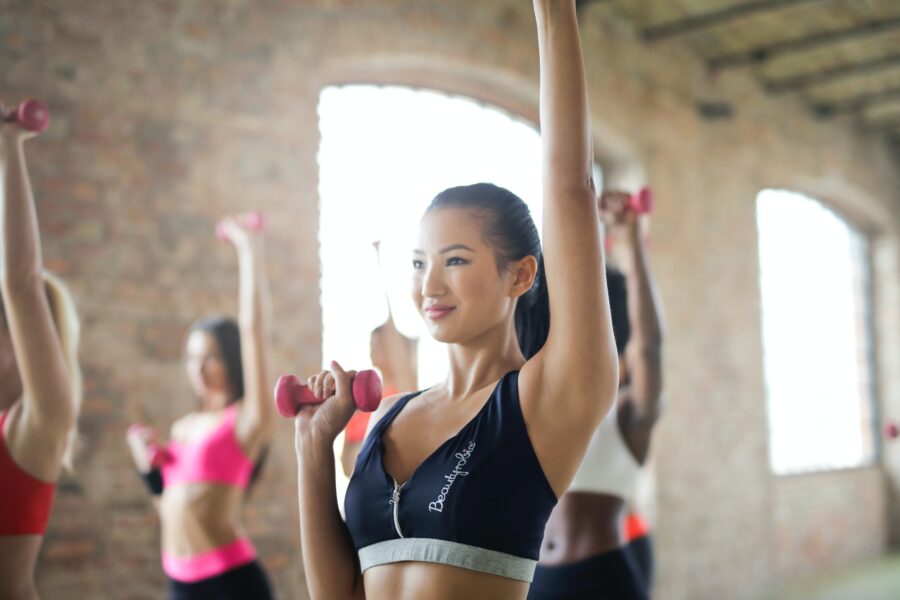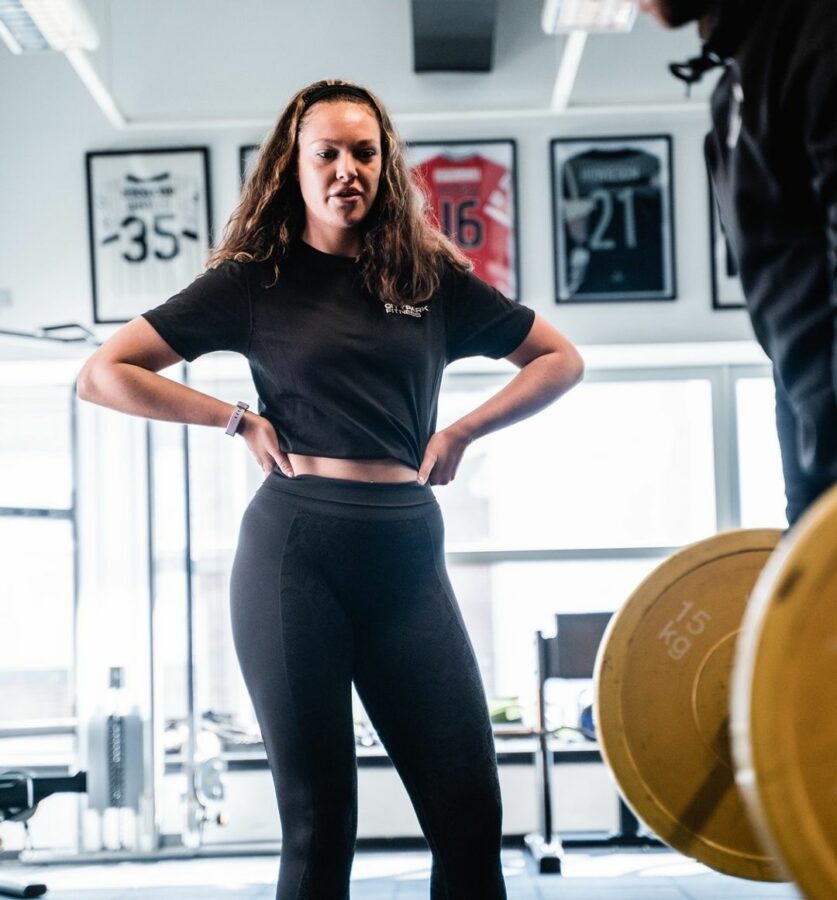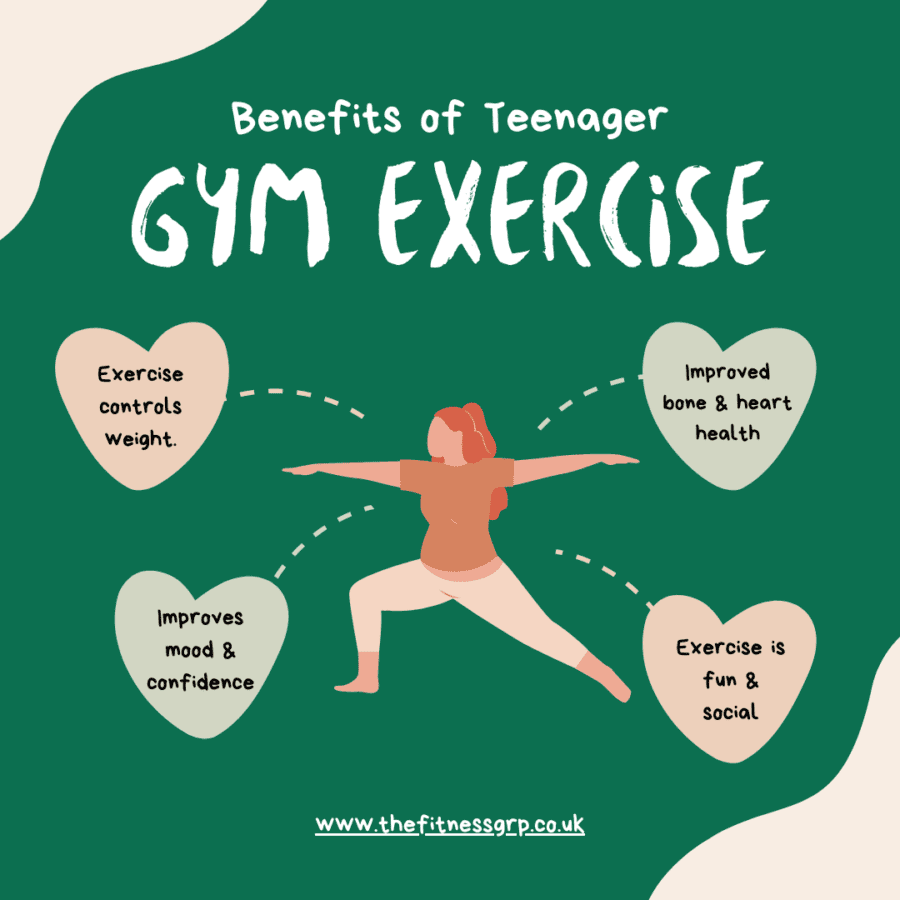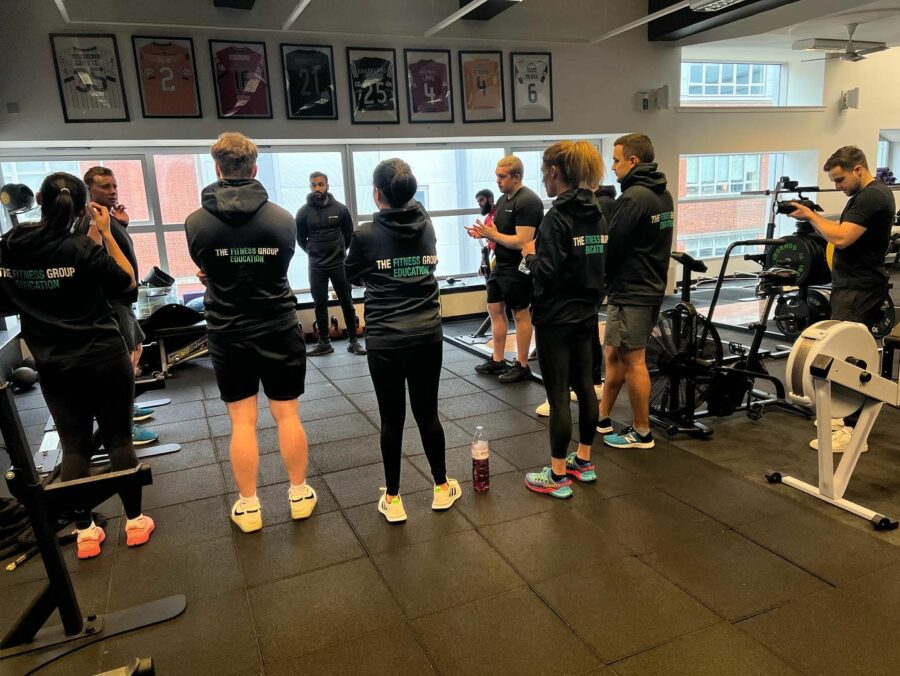Has your child or teenager started to show interest in going to the gym, but you’re not sure what the right age for going to the gym is for children? Or what the legal age to go to the gym in the UK is.
Gyms in the UK have greatly improved what they can offer their members, meaning there is now something for all ages of those wanting to begin their fitness journey. That being said, many gyms across the UK have also introduced their own minimum age to go to the gym, most commonly not accepting members that are less than 16 years old. For example, The Gym and Pump Gym, the latter only allowing 16-year-olds to join with adult supervision. However, there are also a growing number of UK gyms that are offering specific junior gym memberships aimed at teenagers and young children.
This article will explore how teenagers can safely and responsibly use the gym to achieve their fitness goals, offer alternative options for young people looking to keep fit, and discuss the benefits of joining the gym as an older adult.

Contents
- 1 How old do you have to be to go to the gym?
- 2 Legal Age to go to the gym – gym memberships
- 3 How to find the right child-friendly gym
- 4 7 things to consider for young people going to the gym
- 5 Alternative fitness options for teenagers
- 6 How old do you have to be to become a personal trainer?
- 7 What is the oldest age to go to the gym?
- 8 Is it safe for older people to go to the gym?
- 9 What are the benefits of exercise for older adults?
- 10 Summary
How old do you have to be to go to the gym?
While there isn’t any UK law that officially regulates how old you have to be to go to the gym, many gyms have brought in their own minimum age limit for accessing their facilities. This is usually on account of some of the fitness machines in the gym – particularly heavy-weight machines – being harmful to young people if used incorrectly.
However, given the incredible health benefits of physical activity for teenagers and children, many gyms have started to set up their own child-friendly gyms, as well.
Legal Age to go to the gym – gym memberships
| Age Range | Gym Memberships Available |
|---|---|
| 12-16 | Junior Gym or Teen Gym Memberships |
| 16-60 | Standard Adult Memberships |
| 60 + | Senior Adult Memberships |
How to find the right child-friendly gym
If you’ve decided that you do want to introduce your child to the gym, finding somewhere that will support them as they complete their workout is essential. When you’re searching for the right junior gym, make sure to look out for the following features:
Certified staff that have experience training with children
Gyms are a risk-prone environment. That’s why it’s important to find a gym that has trainers qualified to work with children. The best gyms will have their own instructors and personal training team qualified in leading physical activity for adolescents.

A prioritisation of safety and supervision
Ensuring the gym is constantly supervising its younger members is important to keep them safe. Ensuring the staff educates the children on how to safely use the exercise equipment – as well as restricting them from equipment that can cause serious injury like heavy-weight machines – is also a priority.
Fitness programmes aimed at children and teenagers
The right gym will organise separate sessions specifically for children and teenagers to help support them on their fitness journey and address any concerns they might have about initially joining the gym.
7 things to consider for young people going to the gym
After you’ve found the right gym for your child, there are a few other factors you should consider to guarantee they complete a safe and successful exercise session:
Age-appropriate workouts
To reduce the risk of getting injured, it’s important to educate children on which exercises are safe for young gym members.
- Correctly warming up will prevent any unwanted muscle strains during the workout.
- Avoiding high-intensity exercises and heavy weightlifting will help keep pressure off their developing joints.
- Exercises like low-impact workouts, cardiovascular training and more functional movements will help them train without risking injury.
Prior fitness assessments
For many young people, joining the gym will be their first introduction to exercise. Asking a professional to conduct a personal fitness assessment will help them make the most from their gym membership, including identifying any potential health issues that might need addressing.
Nutrition and workout fuel
Eating the right food for exercise will help children reach the demands of a workout. A piece of fruit or a protein bar with give them the energy required for a gym session, while staying hydrated will also help them excel on their new gym journey.
Fitness progression
Given the muscles of teenagers are weaker than their adult counterparts, starting out with low weights before increasing the intensity with time will help their bodies adapt to the new exercises.
Rest and muscle recovery
Knowing when to have rest days is an important part of going to the gym. Teaching children this early will help set them up for the future, as well as help their muscles recover in between.
Realistic mental goals
Going to the gym has been proven to be beneficial for your mental health. However, it’s essential to help your child set realistic goals so they enjoy working out instead of fixating on a specific outcome.
Fun and enjoyment
The gym might seem a little overwhelming for new young members. To help ease them in and encourage them to enjoy their time working out, push them to try different classes and multiple pieces of equipment. For example, cycling, lifting free weights or completing bodyweight exercises. The Little Gym puts a big emphasis on helping young children (between 4 months and 12 years old) get as much enjoyment as they can from exercising.

Alternative fitness options for teenagers
As previously mentioned, many gyms restrict independent access to children below the age of 16. However, there are still numerous alternative options for young people to stay fit and to begin their workout journey.
Family gym memberships
While some gyms won’t let children sign up alone, they do offer family gym memberships. These memberships allow parents to help their children get to grips with the gym, as well as be involved in the first initial part of their fitness journey. Many UK gyms across the nature offer such packages as PureGym, David Lloyd and Virgin Active.
Junior gym memberships
Recently, many leading gyms have also started to offer their own junior gym memberships where children are supervised either by their parents or by a trained professional. Some gyms offering these junior gym memberships are David Lloyd, Everyone Active, and Better Health.
Specialised fitness classes for young people
Similar to the junior gym memberships, many UK fitness centres run specific exercise classes for children and teenagers. These classes typically include age-appropriate workouts that have been designed with young people in mind. Outside of the gym, many local communities also put on adapted versions of popular classes, like Zumba, martial arts, and yoga to help them reach their fitness goals.

Sports clubs run by the school
It can be difficult for children to get a proper workout during P.E. lessons. As a result, many schools will run their own after-school sports clubs where children can develop their fitness levels, build healthy habits and practice their favourite sports. Since these classes are also run by the P.E. teachers, they are already age-appropriate and have been created with children in mind.
Other outdoor activities
Children can often stay fit by just exercising in unconventional settings. Sports like skateboarding and biking with friends, hiking with family members, or just playing in the park after school can promote physical fitness without a second thought. For children looking for something a little more structured, trampoline and bouldering parks allow them to complete a mini workout in a controlled setting.
How old do you have to be to become a personal trainer?
Many children and teenagers’ goal of getting fit extends beyond just joining the gym. To become a personal trainer in the UK, the minimum age you can start studying is 16 years old. Many gyms will also accept applicants for their fitness instructors from 16 years of age.
If you are interested in training children or teenagers in the future, it’s worth noting that along with this insurance, you also must have a specific specialist qualification to teach this age group and you are insured appropriately with the necessary personal training insurance.
While many teenagers might have goals of becoming personal trainers, young age doesn’t necessarily equate with success; many older people are now working to become personal trainers in their later stages of life. Indeed, you are never too old to be a personal trainer and more life experiences usually attracts clients to your services, rather than deters them.
What is the oldest age to go to the gym?
Despite many seeing the gym as the domain of younger people (and while gyms work hard to introduce children and teenagers into working out) completing regular physical activity is also one of the most important things older people can do for their health. For those over 60, keeping fit can prevent or seriously delay many serious health problems that arise when getting older – and going to the gym is a great place to work on this fitness.
Is it safe for older people to go to the gym?
Just like with younger children and teenagers, it can be difficult for older people to know how to get started at the gym. Worrying if working out is safe for this age group is another common worry. However, all older gym-goers need to learn is how to adapt an exercise to reduce the strain on their body. Most gyms will also have organised exercise classes for this specific age group, as well as certified trainers that will help modify the exercises.
What are the benefits of exercise for older adults?
There are many benefits to keeping fit as you get older. When older adults do regular exercise either inside or outside the gym, the following results have been proven:
- A boost in energy levels.
- Much-more mobile movements and a reduced risk of falling.
- An increased sense of independence.
- Improved brain function.
- A lowered risk of heart disease, diabetes, stroke, and osteoporosis.
Guidelines for older adults participating in physical activity
Resuming an exercise regime, or even starting one from scratch, can be daunting for those who are older in age. Sticking to the following guidelines will prevent you from getting injured and boost your confidence in your fitness abilities.
Speak to your doctor
Before beginning a fitness programme it’s important to get medical clearance from your doctor or GP. While it’s likely they’ll give you the go-ahead to get back into exercising, it’s still worth asking if they think there are any activities you should avoid – especially if you already have a preexisting medical condition.
Consider any ongoing health problems
Sometimes, health concerns can affect your workouts. Before deciding what your exercise schedule looks like, it’s essential to keep these concerns in mind. For example, if you suffer from diabetes, you might have to plan your workout around when you take your medication and adjust your meal plans to suit.
Begin slow
It takes time to build up your fitness. Starting slow before increasing the intensity or length of your workouts will help your body adjust to your new regime and reduce the risk of injury. An easy way to do this is by beginning with just one fitness class each week, and then adding in more as you feel your fitness starts to improve.
Pay attention to your body
It’s true when they say the best way to cope with being injured is to avoid getting injured in the first place. Listening to your body will help reduce this risk. Here are some critical signs to look out for:
- If you feel dizzy, short of breath, break out in a cold sweat, or develop sudden chest pain – stop exercising immediately and call your doctor.
- If you find your joints are red, swollen, or tender to the touch – put your exercise routine on hold and come back to it at a later point.
- If you experience discomfort most time after you exercise – try working out for less time but with a higher frequency throughout your day.
Completing a proper warm-up, making sure you cool down, and always having water handy to stay hydrated will also prevent injury and discomfort.
Make a schedule and stick to it
Creating an exercise schedule that lasts at least three weeks will help you ease your way back into working out. Very soon, keeping fit will become a habit that you won’t even think twice about.
Try experimenting with mindfulness
Thinking about how these movements are making your body feel will instantly help improve your physical condition. Practising mindfulness is a great way for older people to make the most of their workouts, for example, focusing on the rhythm of your breathing, how it feels to flex your muscles and even the way that your feet hit the ground.
Summary
To summarise, you don’t have to be a certain age to start going to the gym. And there are actually many benefits of working out for those who fall typically outside of the stereotypical gym age bracket.
While age restrictions do prohibit very young children from exercising and using their equipment, there are certainly many other ways that gyms across the UK are encouraging young children and teenagers to keep fit. The same goes for older adults looking to either resume their fitness journey – or start it from scratch.

